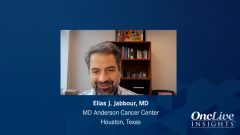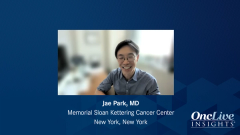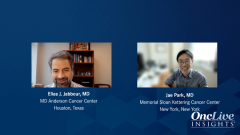
CAR T Therapy for Relapsed/Refractory B-Cell ALL: Selecting Appropriate Patients
Implications of the ZUMA-3 clinical trial of anti-CD19 CAR T-cell therapy for adult patients with relapsed/refractory B-cell acute lymphoblastic leukemia.
Episodes in this series

Elias J. Jabbour, MD: Here’s where we are today. We have several options. We have 2 CAR [chimeric antigen receptor] T-cell therapies available and approved by the FDA. We just had an approval of the Kite CAR T compound from the ZUMA-3 trial. Jae, can you give us more information about these CAR Ts?
Jae Park, MD: Sure. As you nicely laid out this great background, we have seen tremendous advancement in ALL [acute lymphoblastic leukemia], especially the B-cell subtype, in the targeting of these 2 antigens, CD19 and CD22, for inotuzumab. CAR T-cell therapy is the most advanced of the options that we have so far. It’s targeting a single antigen called CD19, which is a universal B-cell marker. Almost all B cells, including ALL cells, express them. Before brexucabtagene autoleucel [brexu-cel] was approved, tisagenlecleucel [tisa-cel] was the only product approved for relapsed/refractory patients with B-cell ALL, but only up to age 25. Until recently, we didn’t have an approved product for patients 26 and older, which was quite a challenge, because it’s actually the children who do better. The adult patients do poorly, so we’re in an urgent need of a better therapy for these patients.
Brexucabtagene is a CAR T-cell therapy targeting CD19. As the name implies, CAR refers to chimera. It takes the head of an antibody and you connect it to the body of a T-cell receptor. In essence, it binds like an antibody but acts like a T cell. It’s trying to take advantage of the best of both worlds in specificity, easy applicability of the antibody, base binding—you don’t need an HLA molecule, it’s the 2 targets together—and a T-cell receptor, which takes advantage of long-term durable survival of the T cells. This hopefully provides the memory or more persistent protection against the cancer cells without needing to give additional or multiple repeated infusions, as we typically do with a chemotherapy or the other antibody-based therapy.
Brexucabtagene is a CD19-targeted CAR T. It’s an autologous product, meaning that we take the T cells from the patient and send them to the manufacturer, where the CAR T cells are generated or genetically engineered, which is about a 2- or 3-week process. From the time of collection of the T cells to the infusion time, it can range from 3 to 4 weeks, during which time we also typically administer what we call bridging therapy. But what can also happen in these patients with acute leukemia is that their disease can progress so quickly from the time of collection and they may get too sick to receive the T-cell infusion. You want to control the disease at minimum during the bridging time.
These autologous CD19 CAR T cells were initially tried in a phase 1 study, and then what led to approval is the phase 2 ZUMA-3 study in adult patients, ages 18 and older in relapsed patients, early and late relapsed patients, including relapse after allogeneic transplant. In those patient populations, at the recommended phase 2 dose that was studied, the complete response rate after 1 month was 70% to 75%, which is very consistent with the response rates that we’re seeing with other CD19 CAR T cells, including tisagenlecleucel, in pediatric and young adults. Those are very good response rates and similar to what we see with inotuzumab as well.
One benefit of the CAR T cell is that it’s a single infusion of the CAR T that’s able to generate this 70% to 80% initial response [rate] in month 1. There are patients who relapse after that, so that’s the challenge. We’ll get to what do we do for those patients and the ways we can potentially reduce the relapse after CAR T-cell infusion. There are also toxicities associated with them that we’ll probably talk about in much more detail.
Elias J. Jabbour, MD: Jae, we have 2 CAR T-cell therapies, tisa-cel and the brexu-cel. How do you choose between them, besides patient age? What are the differences? If I’m a clinician and I want to choose one of them, which would I choose? Let’s say I have somebody who’s 24 years old.
Jae Park, MD: In the younger patients—the age group where they’re eligible—and for adult oncologists treating anyone from age 18 to 25, you’ll have these 2 options. Either of them would be a good option, but there are differences between these 2. One is the CAR construct itself. I talk about the T-cell receptor body, and within the body, there’s what we call costimulatory domain and how these T cells are being stimulated into generating proliferation. Tisagenlecleucel for younger adults is using 4-1BB, and brexucabtagene is using CD28. These are 2 predominant costimulatory molecules, so there are differences in the CAR structure itself and perhaps slightly different adverse effect profiles.
However, probably the biggest difference is that we have much longer follow-up data for younger patients between the ages of 18 and 25 with tisagenlecleucel. Because it was the product that was studied and approved earlier, we have much more robust real-world data for it. If I have a patient between the ages of 18 and 25, I will generally choose tisagenlecleucel, given the robust data in that age group.
Elias J. Jabbour, MD: Correct. And we have long-term follow-up on these data,with survival at 2 or 3 years at 60%, which is amazing.
Transcript edited for clarity.



































